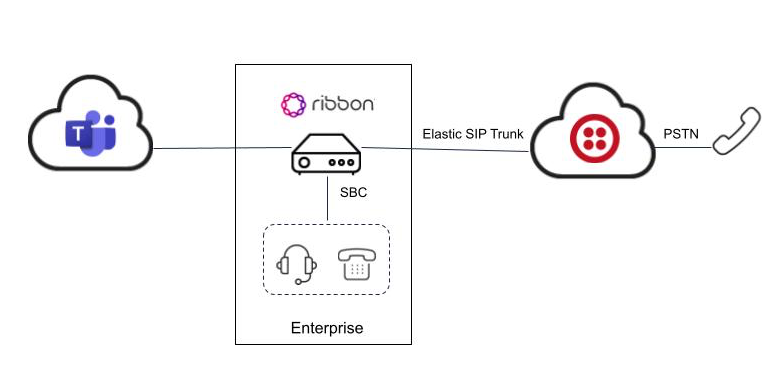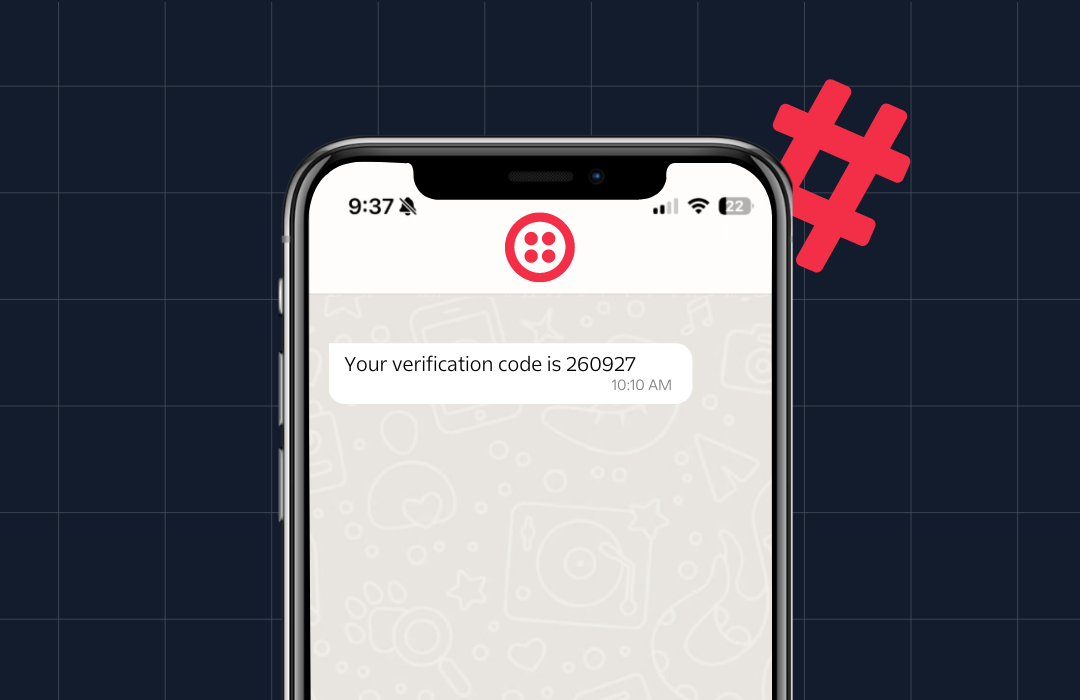Twilio Joins with Ribbon to Expand Global SIP Trunking Solutions for Microsoft Teams
Time to read: 5 minutes

The Direct Routing feature in Microsoft Teams has become the preferred method of connecting users to the PSTN, with media reports indicating upwards of 80% of organizations choosing this option over Calling Plans. Now, Twilio has joined forces with Ribbon Communications to provide enterprise IT managers with a new PSTN connectivity solution for Microsoft Teams that offers truly global coverage, low calling rates and on-demand provisioning.
The joint solution combines Twilio Elastic SIP Trunking with Ribbon SBCs to connect Teams users to the PSTN in up to 100 countries. It enables you to deploy Microsoft Teams with Direct Routing on a global basis with the simplicity of a single, centrally managed solution.
Direct Routing vs Microsoft Calling Plans
IT managers who are rolling out Microsoft Teams for their unified communications service have a choice between two PSTN connectivity options: Direct Routing connects Teams users to a third party SIP trunking service; or Microsoft Calling Plans is Microsoft’s own PSTN service for Teams users. Each option presents trade-offs that affect cost, flexibility, local numbers and complexity. You should carefully evaluate the options before selecting a solution. We’ve listed the key comparison points below.
Direct Routing advantages
- Global coverage - Depending upon the SIP trunking provider you choose, you may find DID and toll-free numbers are available in more places, than the 15 countries supported by Microsoft Calling Plans. For example, Twilio Elastic SIP Trunking offers service in 100 countries.
- Low rates - PSTN usage rates may be lower; we recommend you compare prices for inbound, outbound and toll-free services by country.
- Flexible migration - Your SBC connects users on legacy telephony systems to those on Microsoft Teams. This provides flexibility to migrate users at your own pace, instead of managing a flash cut, and enables users connected to specialized telephony systems (e.g. contact centers) to communicate with Teams users.
- Routing flexibility - You can leverage your SBC and/or SIP trunking service provider to apply routing policies before session hand-off to Microsoft Teams. This enables you to control the experience, including outbound source phone number and inbound routing.
- Simplified operations - Consolidate Microsoft Teams trunks with other trunk services (CCaaS, on-premises VoIP, embedded apps., etc.). Instead of fragmenting PSTN connectivity across multiple providers, you can simplify operations and administration by leveraging a single SIP trunking service provider for all your PSTN connectivity needs.
- Eliminates Cloud Connector Edition - Organizations migrating from Skype for Business will be pleased to know that a Microsoft certified SBC takes the place of Cloud Connector Edition (CCE). Microsoft CCE was the platform that previously enabled SIP trunking connectivity for SfB.
Microsoft Calling Plans advantages
- One-stop shopping - Eliminates the time and effort required to select a SIP trunking provider and administer payments for an additional vendor.
- No SBC required - Microsoft applies security policies between the PSTN and Teams Phone System users.
Both PSTN connectivity options can port your existing DID numbers and provide emergency calling (e.g. E911). However, emergency calling coverage outside of the US and Canada may be limited. We recommend you compare emergency calling capabilities offered by Microsoft Calling Plan and your SIP trunking service provider for the countries where you users are located.
Global solution for Direct Routing
Solutions based on Microsoft Direct Routing connect Teams users to the PSTN via a SIP trunking service. The joint Twilio/Ribbon solution is composed of a Ribbon SBC and a Twilio Elastic SIP Trunk. The SBC forms the pivot point in the solution, routing calls between the Microsoft cloud and the Twilio SIP trunking service.
The Ribbon SBC can be deployed on-premises as a hardware appliance or as virtualized software. It can also be purchased as a cloud instance in the Azure Marketplace or on AWS, which eliminates local points of failure (power outage, local ISP outage, etc.).

Ribbon SBCs anchor the SIP communications environment
Ribbon’s SBCs are designed to secure SIP communications interfaces and ensure interoperability across the multivendor SIP communications environment. It applies security policies to protect privacy and prevent attacks. It modifies SIP messages as needed to enable devices and cloud services to communicate, including the Microsoft and Twilio cloud services and legacy on-premises telephony equipment.
In addition to our joint work to support Microsoft Teams, Twilio and Ribbon have separately verified interoperability with Cisco Unified Communications Manager (CUCM), a licensed software product designed for deployment in corporate data centers. Ribbon SBCs enable CUCM to connect to a Twilio Elastic SIP Trunk independent of Microsoft Teams.
In the Microsoft Direct Routing solution, the session border controller provides multiple functions:
- Security – The SBC acts as a voice-aware firewall and encrypts traffic to protect the voice traffic itself and to prevent bad actors from entering the data network via the voice network.
- Interoperability – not every SIP interface is identical, Ribbon SBCs adjust key parameters to make deployment easy and trouble-free
- Legacy connectivity – Ribbon hardware-based SBCs offer analog ports for connectivity to analog phones, elevator phones, door phones and fax machines.
- Migration – often organizations want to slowly migrate to Teams, keeping their legacy PBX in place for weeks or even months or years. Ribbon SBCs can provide simultaneous ringing so that both Teams and the old PBX share connectivity.
- Resiliency or Fail over – Ribbon SBCs feature WAN resiliency and high availability options to manage disruptions in service, depending on the deployment model. They support Teams Survivable Branch Appliance (SBA) software that takes over if the Microsoft 365 cloud is unreachable. These tools can keep your organization connected even if the unexpected happens.
Twilio Elastic SIP Trunking delivers global PSTN connectivity
Twilio Elastic SIP Trunking services complement the joint solution. Twilio is a SIP trunking specialist that brings the scale, innovation and expertise of a global leader to Microsoft Teams customers. Twilio can help you reduce PSTN usage costs and extend a local customer experience to users in up to 100 countries.
- Global coverage - Twilio Elastic SIP Trunking offers service in 100 countries, including clean, toll-free and DID phone numbers.
- Low costs - Twilio Toll-free and DID prices are among the lowest in the industry
- On-demand provisioning - Phone numbers and trunk services in any country can be provisioned in minutes through the central Twilio portal or API
- Flexibility and control - A range of routing services and complementary applications can be added to your trunks. This enables you to control the experience, including outbound source phone number and inbound routing.
- Simplified operations - Twilio SIP trunks can consolidate PSTN connectivity across all your communications services, including VoIP, UC, collaboration and communications-enabled applications
These advantages, combined with the reliability of the global Twilio Super Network and our auto-scaling capacity, make Twilio Elastic SIP Trunks an excellent solution for Microsoft Teams customers.
Deploy Microsoft Direct Routing with confidence
Direct Routing has quickly become the preferred method of connecting Microsoft Teams users to the PSTN. It gives enterprises flexibility to source PSTN connectivity services from their preferred SIP trunking service provider and they can leverage geographic coverage, features and usage rates tailored to their organization.
The joint Twilio and Ribbon solution for Microsoft Teams provides IT managers a highly reliable solution for PSTN connectivity in up to 100 countries. It features low calling rates, on-demand provisioning and interoperability with legacy telephony systems that helps streamline user migration. The solution is verified and supported by Ribbon and Twilio so that you can deploy it with confidence.
Related Posts
Related Resources
Twilio Docs
From APIs to SDKs to sample apps
API reference documentation, SDKs, helper libraries, quickstarts, and tutorials for your language and platform.
Resource Center
The latest ebooks, industry reports, and webinars
Learn from customer engagement experts to improve your own communication.
Ahoy
Twilio's developer community hub
Best practices, code samples, and inspiration to build communications and digital engagement experiences.


